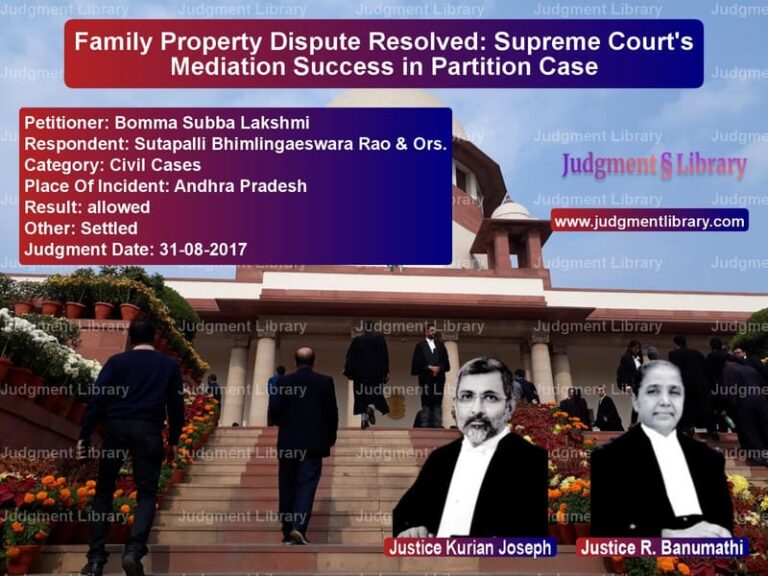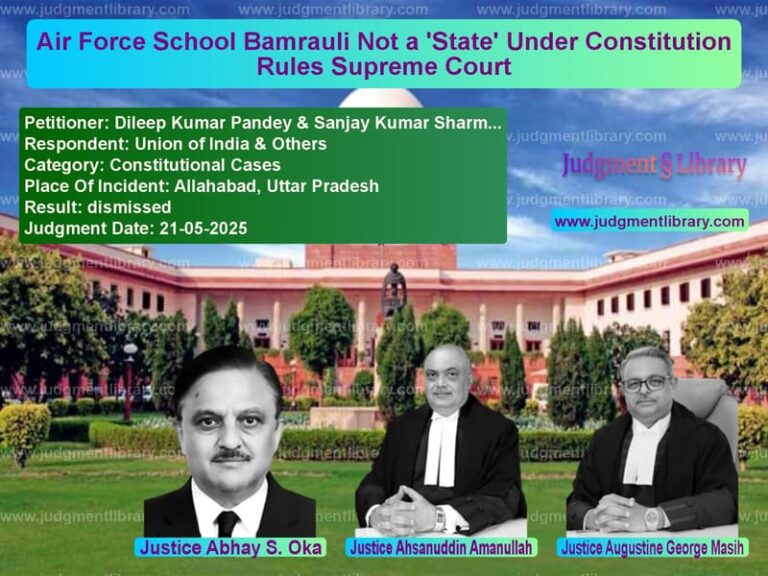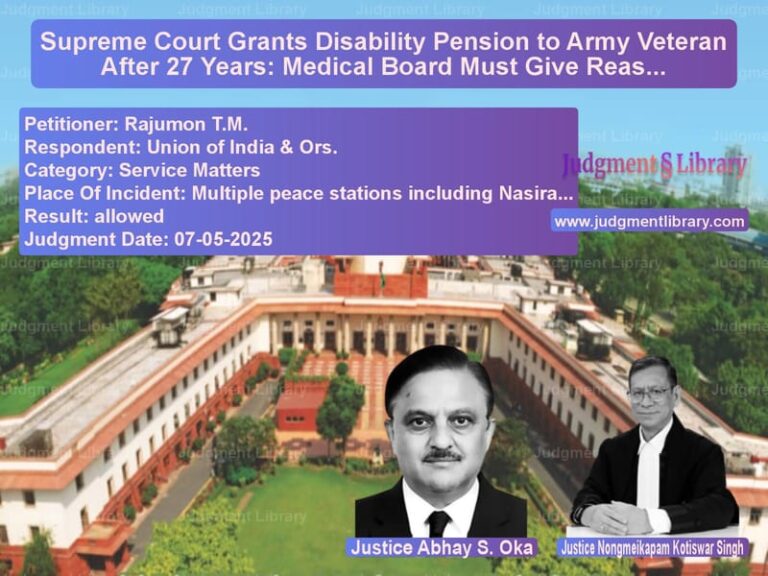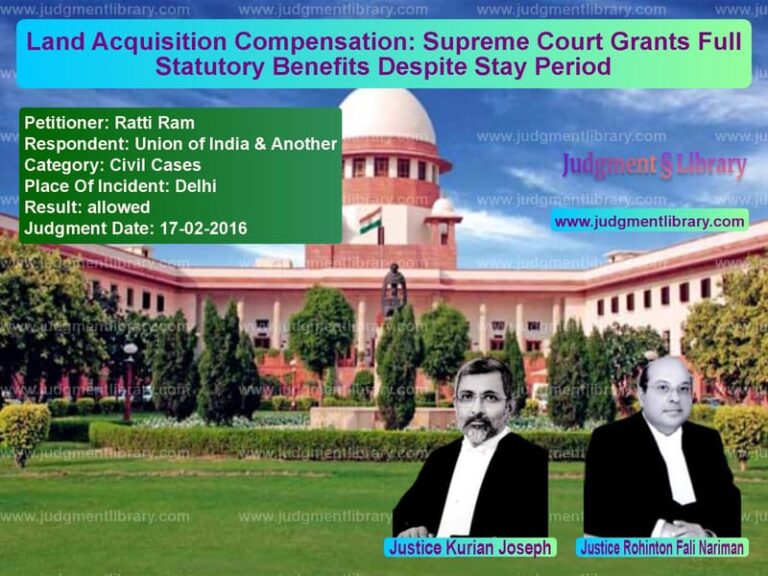Termination of Service for Criminal Allegation: Supreme Court Orders Reconsideration of Employee’s Disqualification
The Supreme Court of India recently delivered a judgment in the case of Union of India & Ors. vs. Amit Singh, concerning the termination of an employee based on the suppression of information about his involvement in a criminal case. The case addressed the issue of whether an individual’s termination from service on the grounds of non-disclosure of a criminal case can be justified, and how the seriousness of the case should affect the decision regarding the employee’s fitness for service.
Background of the Case
The respondent, Amit Singh, was employed with the Central Reserve Police Force (CRPF) in 2011. During the recruitment process, Singh had been asked to declare any involvement in criminal cases. He failed to disclose an incident involving a cricket match altercation, which had led to a minor criminal case. Although the case was subsequently compounded by the learned magistrate and had no serious consequences, the CRPF considered this non-disclosure as a ground for his termination after his service commenced.
Singh’s termination was challenged by him on the grounds that the information about the criminal case was trivial and did not affect his suitability for the job. The petition came before the High Court, which ruled that his termination was illegal and ordered his reinstatement. The appellant (Union of India) appealed this decision in the Supreme Court.
Petitioner’s Arguments (Union of India)
The petitioners, represented by the legal counsel for the Union of India, argued the following:
- The termination was based on non-disclosure of material facts during the recruitment process.
- Information regarding past involvement in a criminal case, even if trivial, was essential to ensure the integrity of the force.
- The failure to disclose such information was a violation of the terms of employment and called for disqualification.
- While the charge against Singh was not severe, non-disclosure of criminal involvement was a serious lapse.
Respondent’s Arguments (Amit Singh)
The respondent, Amit Singh, countered the arguments by stating:
- The criminal case was a minor altercation and had been resolved with a compounded order from the Magistrate, which meant no conviction.
- The non-disclosure was an inadvertent omission and did not affect his performance during the service period.
- The termination was disproportionate to the minor nature of the offense, and the non-disclosure did not harm the interests of the employer.
- The CRPF’s own internal regulations do not mandate termination for such minor issues, and this case should be treated as an exception rather than a rule.
Supreme Court’s Judgment
The Supreme Court examined the facts of the case in detail, including the trivial nature of the criminal case, the timing of its occurrence, and the relevant legal framework.
The Court delivered its judgment, making the following key observations:
- “The non-disclosure of the minor criminal case was an omission, but the termination could not be justified on this ground alone. The termination was disproportionate to the facts of the case.”
- “While disclosure of criminal antecedents is important for any recruitment process, the failure to disclose an offense of a trivial nature, which had been compounded, should not automatically result in termination of service.”
- “The Court must consider the nature of the offense and the impact of non-disclosure before deciding on the penalty. In this case, the employee had completed a significant part of his service without issue, which mitigated the gravity of his lapse.”
- “It is also necessary to account for the age of the offense, the circumstances under which the information was suppressed, and whether the omission was intentional or inadvertent.”
- “In such cases, the employer should have considered the circumstances and the personal conduct of the employee over the years, instead of resorting to termination immediately.”
The Court referred to the judgment in Avtar Singh v. Union of India (2016), which dealt with similar issues regarding disclosure of criminal antecedents during recruitment, specifically noting that in trivial cases, the employer should exercise discretion.
Considering these aspects, the Court held:
- “The respondent should be allowed to file an appropriate representation to the appointing authority to explain the situation.”
- “The appointing authority should take a decision on this representation after considering the relevant facts, including the trivial nature of the offense, the lapse in disclosure, the employee’s conduct during his service, and his long-standing record of service.”
Key Takeaways from the Judgment
- The failure to disclose minor criminal offenses should not automatically lead to termination, particularly when the offense was minor and had been resolved with no conviction.
- The employer must consider the circumstances surrounding the non-disclosure and the nature of the offense before taking a decision on termination.
- Courts should not enforce draconian measures for trivial lapses that do not materially affect the employee’s fitness for service.
- Employers are encouraged to take a holistic view of an employee’s conduct, including their service record, before making decisions about their future with the organization.
- The judgment reinforces the principle of proportionality in disciplinary actions taken against employees.
Conclusion
The Supreme Court’s ruling in Union of India & Ors. vs. Amit Singh provides clarity on the approach towards termination in cases involving minor criminal cases and non-disclosure of antecedents. The decision highlights that termination should be a proportionate response, considering all circumstances, including the nature of the offense and the employee’s overall conduct. This judgment is an important reminder that employers should exercise discretion and fairness in disciplinary actions and not take punitive steps without fully considering the facts and context of each case.
Don’t miss out on the full details! Download the complete judgment in PDF format below and gain valuable insights instantly!
Download Judgment: Union of India & Ors vs Amit Singh Supreme Court of India Judgment Dated 15-11-2017.pdf
Direct Downlaod Judgment: Direct downlaod this Judgment
See all petitions in Employment Disputes
See all petitions in Disciplinary Proceedings
See all petitions in Public Sector Employees
See all petitions in Judgment by Kurian Joseph
See all petitions in Judgment by R. Banumathi
See all petitions in allowed
See all petitions in Remanded
See all petitions in supreme court of India judgments November 2017
See all petitions in 2017 judgments
See all posts in Service Matters Category
See all allowed petitions in Service Matters Category
See all Dismissed petitions in Service Matters Category
See all partially allowed petitions in Service Matters Category







